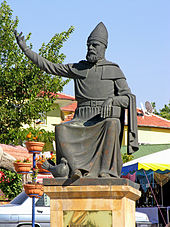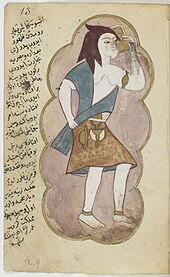Hajji Bektash

Hajji Bektash Wali ( Ottoman / Persian حاجی بکتاش ولی Ḥādschī Baktāsch Walī , modern Turkish spelling: Hacı Bektaş-ı Veli ) was a Muslim mystic ( Sufi ) from Khorasan wholived and workedin Anatolia in the second half of the 13th century . Wali or Veli is not part of one's personal name, but an Islamic honorary title meaning "friend (Allah)". The Bektaschi - Tariqa (Bektaschi Dervish Order) is named after him, but in all probability it was not founded by himself, but by Balım Sultan .
Not much is known about his life. It is certain that a person with this name existed and had a significant influence on the population of Anatolia. However, everything else falls largely within the scope of legend. The mausoleum of Hajji Bektaschi Veli is located in Hacıbektaş in Turkey and is a place of pilgrimage for Alevis .
The main source for Haji Bektash's life is the Walāyat-Nāma of the Turkish scholar Uzun Firdewsi from the late 15th century.
origin
Hajji Bektash was born in Nishapur in western Khorasan (now Iran ). According to the Walāyat-Nāma he was the son of a certain Sayyid Muhammad bin Musā and, it is claimed, a descendant of the Imam Mūsā al-Kāẓim , the 7th Imam of the Imamites . However, this is a very obvious mistake by the author, because it is impossible to state it in terms of time. There is also no evidence from other sources whether it actually came from Nishapur. The term "Horasan erenleri" (Turkish: "the Holy Khorasans" ) was a general honorific title for many mystics and religious scholars among the Turkmen nomads of Anatolia, because the East Persian Khorasan was a center of the Islamic heyday . Viewed differently, the name is also an indication that Hajji Baktāsch actually came from Khorasan. According to the Encyclopædia Iranica, it is very likely that Hajji Bektash fled the Mongol invasion westward into the Rum Seljuk empire , which had developed into a refuge for Iranian scholars and saints, and was therefore of Iranian descent. ( see also: Rumi , Attar )
According to legend, at the time of his flight to Anatolia he was a forty-year-old dervish of the Yesevi-Tariqa and the chalifa (deputy) Ahmed Yesevis , the founder of the order. But even this claim is impossible in terms of time and should rather be understood as a later innovation that is supposed to bring the two saints together.
On the other hand, the assumption that Hajji Bektash belonged to the Qalandari Sufis Bābā Rassul-Allāh Eliyās Chorāsānīs (executed in 1240) is more credible. This assumption is indirectly confirmed by early chronographs of the Mevlevi dervishes , who describe him as an anti-Orthodox mystic with “ Gnostic illumination” who “ completely rejected Sharia ” - characteristics that were very typical of East Persian Qalandari mystics of the time.
history
Hadschi Bektash settled in Sulucakarahöyük (today Hacıbektaş , Nevşehir Province ), possibly because there were few Tekkes there at the time . Sulucakarahöyük was a remote place, far from the centers of Anatolia , where the political events and brisk trade took place.
Soon after his arrival, his reputation as a spiritual guide spread. People of opinion helped him to systematize his teaching. A monastery was built and numerous students - mainly from the Turkmen nomadic tribes - gathered around it. Wandering dervishes carried his teaching to villages and towns. One of the most famous among them was the poetic dervish of the Bektashi-Tariqa, Yunus Emre (d. Approx. 1321), who recorded the teachings of Hajji Baktāsch in innumerable poems. Another, no less well-known student was the Persian poet and traveling preacher Schams-e Tabrizi , who, as a teacher and companion of Jalal ad-Din Rumi, inspired him to write his mystical poems.
Teaching and works
The only works that can credibly be traced back to Hajji Bektash himself are the Maqālāt ( Arabic مقالات 'Treatises'), also known as Küçük Vilayetnâme in Turkish . It was published in Arabic .
The Turkish scholar Firdewsi collected the various stories about Hajji Bektash and wrote the biography Walāyat-Nāma .
His thoughts were revolutionary in his time and fascinated people of different faiths.
philosophy
Hundreds of sayings go back to Hajji Bektasch Veli, which explain his philosophy and are passed down by Alevis or Bektaschis:
- The universe is the visible form of God
- Ritual prayers don't make people better
- It is the actions that count, not the words
- Do not pray with your knees, but with your heart
- The most important book to read is man
- Happy is he who illuminates the darkness of thought
- Give women a good education
- There is no opposition between God and human being, but rather deeply connected to one another
- Rust does not glow by itself, but from the fire
- The mind is in the head, not in the crown
- You will find what you are looking for in yourself, not in Jerusalem, not in Mecca
Mausoleum and place of pilgrimage
The mausoleum of Haci Bektash Veli is located in the Nevşehir Province of Turkey and is a place of pilgrimage for Alevis. Every year on August 16, Alevis make a pilgrimage to the place named after him, Hacıbektaş, about 45 km north of Nevşehir .
influence
Even today, the Alevis call (a Shiite represent influenced denomination and among other imams especially Ali , the cousin and son Muhammad worship) "Alevi-Bektashi" . The followers of Haji Bektash living in the south of Albania are officially recognized as a separate group.
literature
- Irène Mélikoff: Hadji Bektach: Un mythe et ses avatars. Genèse et évolution du soufisme popular en Turquie. Islamic History and Civilization, Studies and Texts. Vol. 20. Brill, Leiden 1998. ISBN 9004109544
Web links
supporting documents
- ↑ A. Gölpinarli, ed., 1958, ff. Xix-xxv
- ↑ a b H. Algar, "Khorāsanian Sufī Hāji Bektāŝ" , Encyclopædia Iranica , p. 117 f., Online Edition
- ↑ Aflākī, 1953, I, pp. 381–382
- ↑ Elvân Çelebi, ed., 1984, p. 17
- ↑ Erünsal / Ocak, "Hacı Bektaş Veli" , Introduction, xli-xlv
- ↑ plural of Arabic مقالة, DMG maqāla 'treatise'.
- ↑ http://www.hacibektas.com/index.php?id=kultur_ve_sanat
| personal data | |
|---|---|
| SURNAME | Hajji Bektash |
| ALTERNATIVE NAMES | Hajji Bektash Wali; Hacı Bektaş Veli (Turkish) |
| BRIEF DESCRIPTION | mystic |
| DATE OF BIRTH | 13th Century |
| DATE OF DEATH | 13th Century |


